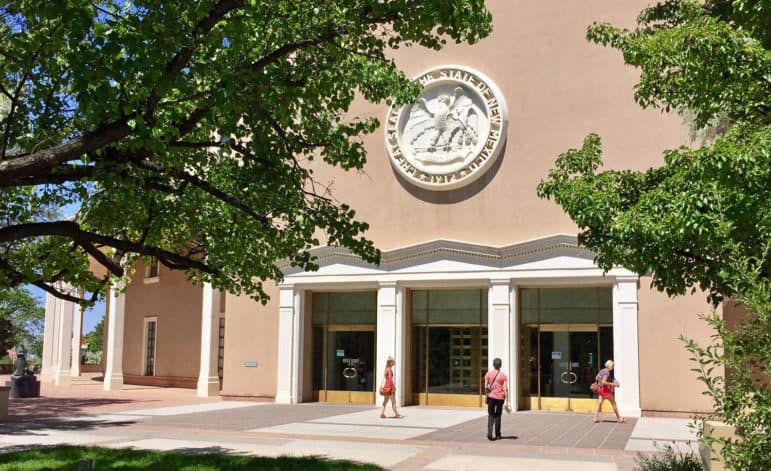
Heath Haussamen / NMPolitics.net
The Roundhouse in Santa Fe.
State Rep. Georgene Louis, who grew up in Acoma Pueblo, said she and other Native Americans often were told, “Your vote doesn’t matter.”
She believes a lot of people in America feel that way, she said Wednesday to other members of the House State Government, Elections and Indian Affairs Committee, particularly during presidential elections when the Electoral College trumps the popular vote.
That’s why Louis, an Albuquerque Democrat, said she joined fellow Democrats on the committee to vote 6-3 in favor of a bill to elect the U.S. president by popular vote.
Rep. Gail Chasey, also a Democrat from Albuquerque and one of the sponsors of House Bill 55, told the committee members: “Every vote should count equally. Period.”
The legislation has a long way to go before becoming reality. The bill needs to clear the House Judiciary Committee, then gain the support of the full House of Representatives and Senate.
Gov. Michelle Lujan Grisham would then have to sign it into law.
For the effort to become national law, the popular vote movement would need to earn far more support. So far, just 12 states and the District of Columbia have voted to join the effort.
The U.S. Constitution gives state legislatures control over awarding their electoral votes, Barry Fadem, president of the California-based nonprofit National Popular Vote Inc., told the New Mexico House committee on Wednesday. But states can pledge to give all of their electoral votes to the candidate who wins the popular vote nationwide.
Currently, all but two states — Nebraska and Maine — have a winner-takes-all system of awarding electoral votes in presidential races.
If enough states sign off on popular vote legislation to collectively amass 270 electoral votes — the number needed for a candidate to be elected president — the change can go into effect.
To date, the interstate compact in favor of the popular vote measure has accumulated 172 electoral votes, Fadem said. If New Mexico, which has five electoral votes, entered the compact, that would leave the movement 95 votes shy.
The three Republicans on the House committee countered that electoral votes matter more in a small, rural state like New Mexico. HB 55 would hurt state residents, they argued, because the state’s votes in the Electoral College would go to the winner of the national popular vote even if that candidate lost the presidential race in New Mexico.
Republican Donald Trump won the 2016 presidential election with 304 Electoral College votes compared to 227 for Democrat Hillary Clinton. Trump won 30 states’ electoral votes, while Clinton won 20 states, including New Mexico, and the District of Columbia. All of Nebraska’s votes went to Trump; Maine split its votes, giving three to Clinton and one to Trump.
Nationwide, Clinton received 2.6 million more popular votes than Trump. That marked the fifth time in U.S. history that a president was elected without receiving the most votes — a point made by Chasey, Fadem and a number of others who spoke in favor of HB 55.
The Electoral College was created in 1787 during the Constitutional Convention in Philadelphia as a way to ensure that citizens in each state had informed electors in place to represent them in major elections. Each state gets a number of electors equal to the total of its combined House and Senate members in Congress.
